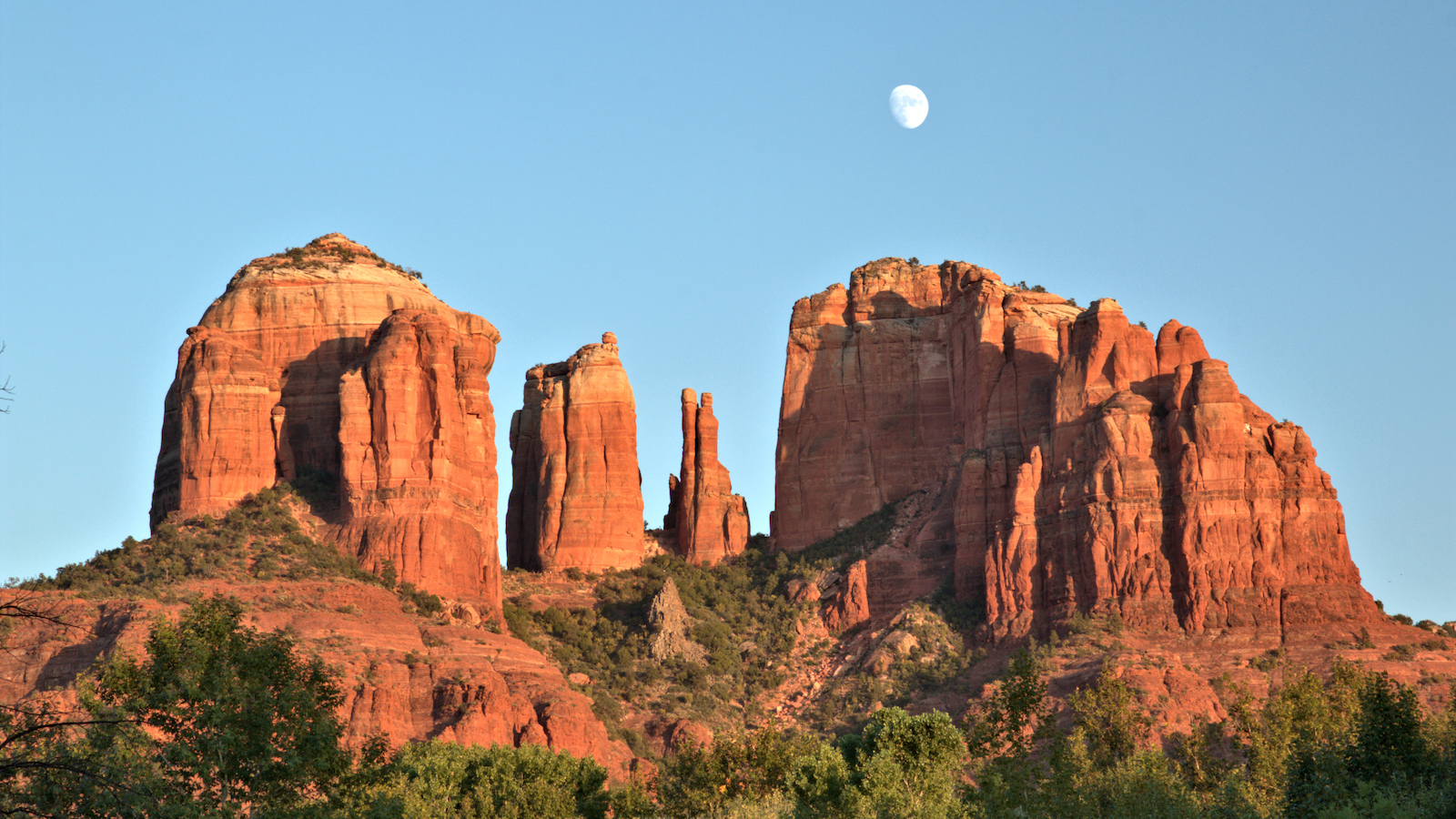
Come for the red rocks, stay to recharge and renew your spirituality with outdoor adventure, vibrant arts, New Age vortexes and other places of worship, or connecting with Native American history and culture.
With dramatic landscapes to hike and bike, luxurious and unique spa treatments, award winning dining, golfing or just as a stop on the way to the Grand Canyon, Sedona is a true paradise for vacationers.
There are three main routes into Sedona: north from Phoenix along I-17 and Route 179 (the Red Rock Scenic Byway); south from Flagstaff through Oak Creek Canyon on Route 89A; and east from Jerome and Prescott, also on Route 89A. You will need a car or an RV to get around. Sedona is easily combined with a trip to the Grand Canyon’s South Rim, just two hours to the north, and also feasible as a longer trip from Las Vegas, roughly four and a half hours to the northwest.

Phoenix’s Sky Harbor International Airport is the closest major airport to Sedona, just 120 miles (193 kilometers) south of town via the interstate. The drive is roughly two hours, depending on traffic. This is one of the busiest airports in the United States, with thousands of flights arriving and departing daily. There are numerous car rental agencies at the airport.
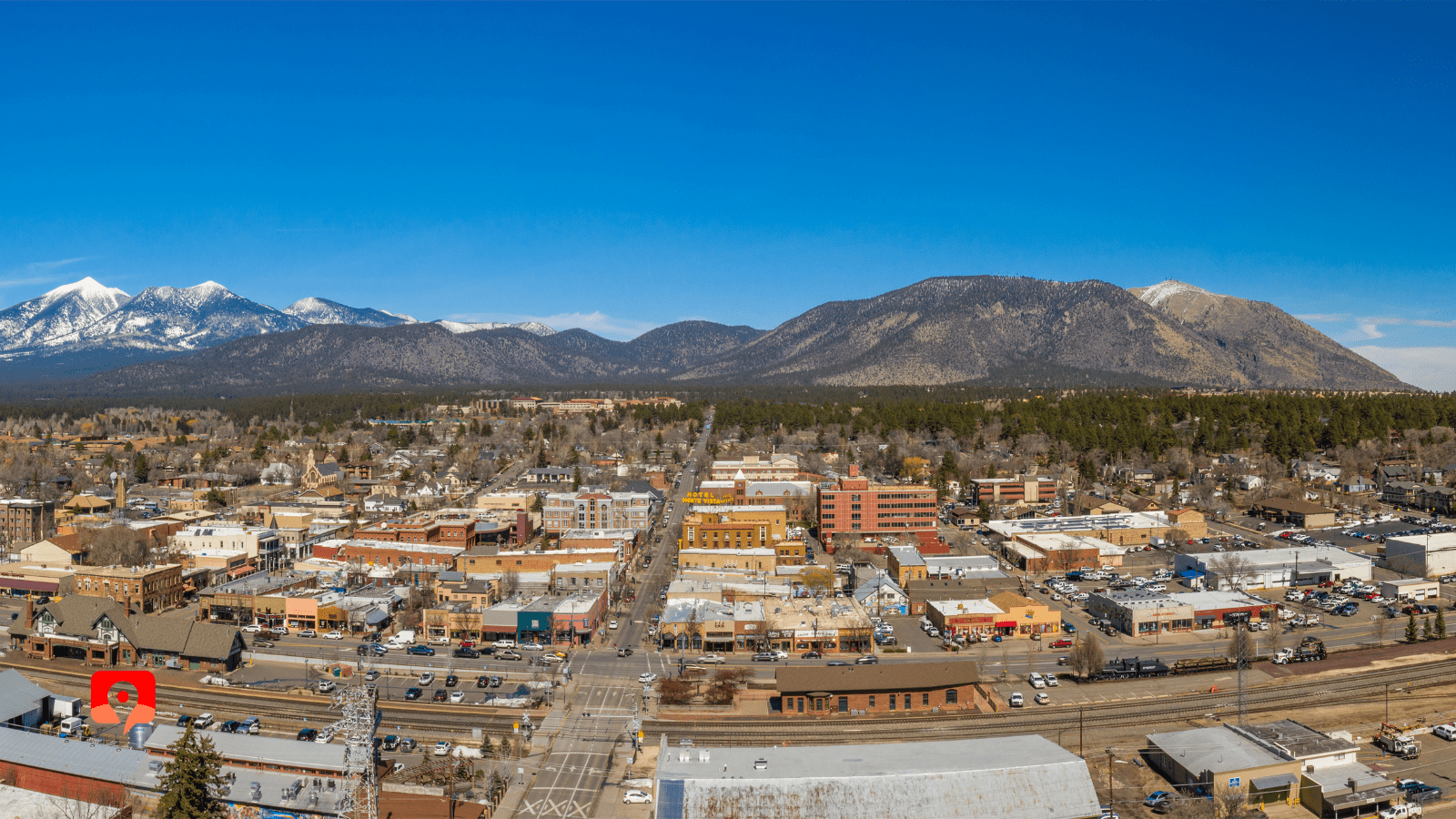
Flagstaff is the closest airport to Sedona, just 25 miles (40 kilometers) north of town and conveniently located across from the entrance to Oak Creek Canyon. However, given the paucity of flights to Flagstaff, you may find that it’s quicker, more convenient, and cheaper to plan on driving from Phoenix instead, as many connecting flights go through Sky Harbor Airport anyway.

If you’re road tripping through the Southwest, you’ll find that Sedona makes for a convenient stop. The South Rim of the Grand Canyon is just 113 miles (181 kilometers) to the north, via Route 64 and Interstate 40. If you’re traveling east–west, Interstate 40 is ideally located just thirty miles north of town, where it passes through Flagstaff. Serious road trippers also know that historic Route 66 also passes through Flagstaff, roughly paralleling Interstate 40 as it crosses the state of Arizona.

The best way to get around Sedona is by car, to have the freedom to stop at any and all of the viewpoints and hiking trails at your leisure. A free shuttle service is also available to some of the most popular trailheads in Sedona.

There are a handful of state parks and national forest sites in the Sedona area, including: Red Rock State Park, Slide Rock State Park, Grasshopper Point, Crescent Moon Picnic Site, and West Fork of Oak Creek Canyon, where you’ll need cash to pay the entrance fees.
Additionally, to park on National Forest land outside Sedona and in Oak Creek Canyon, you’ll need to either buy a Red Rock Pass or use an America the Beautiful National Parks Pass if you already have one. Either pass should be displayed at all times – but be careful. On really hot days, passes have been known to melt to the dashboard! Make sure to get a hangtag for the rearview mirror.
You can buy the Red Rock Pass at ranger stations, visitor centers, or at vending machines in most parking lots. Do note that neither pass is valid at state parks or campgrounds. Additionally, the Red Rock Pass is not valid at national parks or monuments, such as the Grand Canyon.
Accommodation within Sedona itself is limited: make sure to book well ahead, whatever your budget. Rates peak in spring. Some of the nicest choices are the intimate B&Bs and upscale resorts, many of which are located on the outskirts of town in choice desert locations. There are a handful of less expensive motels along the main strip in West Sedona and uptown.
Vacation homes can be an interesting option, though like hotels, these tend to book up quickly, and may require a minimum-night stay in high season. There are at least two RV parks in town, plus three highly coveted National Forest campsites in Oak Creek Canyon, and one campground south of town on Highway 179. If you have dreams of pulling up on a back road and unrolling a sleeping bag beneath the stars, think again. There is not much public land in the area; consequently dispersed camping and RV boondocking options are limited.

Sedona is perfect in spring and fall, when the weather is warm and the desert scenery is splashed with color. The wildflowers are in bloom in spring, and temperatures average in the sixties in early March, before climbing up to the eighties by May. Fall is October and November, and if you time it right, you’ll be able to hike the West Fork of Oak Creek beneath the shimmering golden leaves of the cottonwoods and sycamores.

Summer can be blistering, with temperatures averaging in the 90s and little shade to provide relief. Despite this, it’s cooler than Phoenix, and you can often find very good deals on spas and high-end resorts during this time. Winter, meanwhile, is the secret season. Even if it’s chilly, you might be lucky and catch a dusting of snow in the morning, and the relatively fewer crowds make wandering around town a delight. Notable events throughout the year include the Food Truck Festival in March, the International Film Festival in June, National Cowboy Day in July, the Sedona Arts Festival in October, and the Festival of Lights in December.

While you could do our driving tour in a single day, most visitors will want to spend at least one night here to get the most Sedona has to offer.
The town itself is relatively small, and its activities – gallery hopping and shopping, top-notch restaurants, and yoga, massage and meditation – could easily be experienced in a day. But it’s the outdoors that are the real draw: if you’re big on hiking and landscape photography, Sedona could keep you busy for days on end. Heck, you might even find yourself wanting to move here!
Overall, we would recommend a day spent exploring the trails to the south and west of town, and another day divided between the sights in town and the beautiful drive up Oak Creek Canyon to Flagstaff. If you have time, definitely check out the nearby Native American ruins, and the historic mining town of Jerome and the nearby wineries in the Verde Valley.

Sedona averages three million visitors per year, and the busiest months unsurprisingly coincide with the nicest weather: March through May and October. Parking can be a major challenge in high season, as the town itself is a small place (only 10,000 year-round residents). However, on the flip side, Sedona’s main attraction is the landscape, and there are limitless possibilities for exploration: the farther you get from town, the better luck you’ll have finding parking spots and less crowded trails.
No matter where you go, we recommend waking up at dawn, especially if you’re planning on going to a spot with limited parking, like the West Fork of Oak Creek or Devil’s Bridge. In the heat of summer, this will be the most pleasant time of day to be outdoors too.

There are scenic drives aplenty in Sedona. The Red Rock Scenic Byway, or Route 179, takes you past the iconic formations Bell Rock and Cathedral Rock south of town. In the other direction, the lush Oak Creek Canyon drive, or Route 89A, links up Sedona with Flagstaff and the high desert with the world’s largest ponderosa pine forest through two thousand feet of elevation change. Finally, west of town, also on Route 89A, are the back roads leading to Boynton Canyon, where you’ll pass photogenic formations like Devil’s Bridge before coming to the breathtaking box canyon itself.
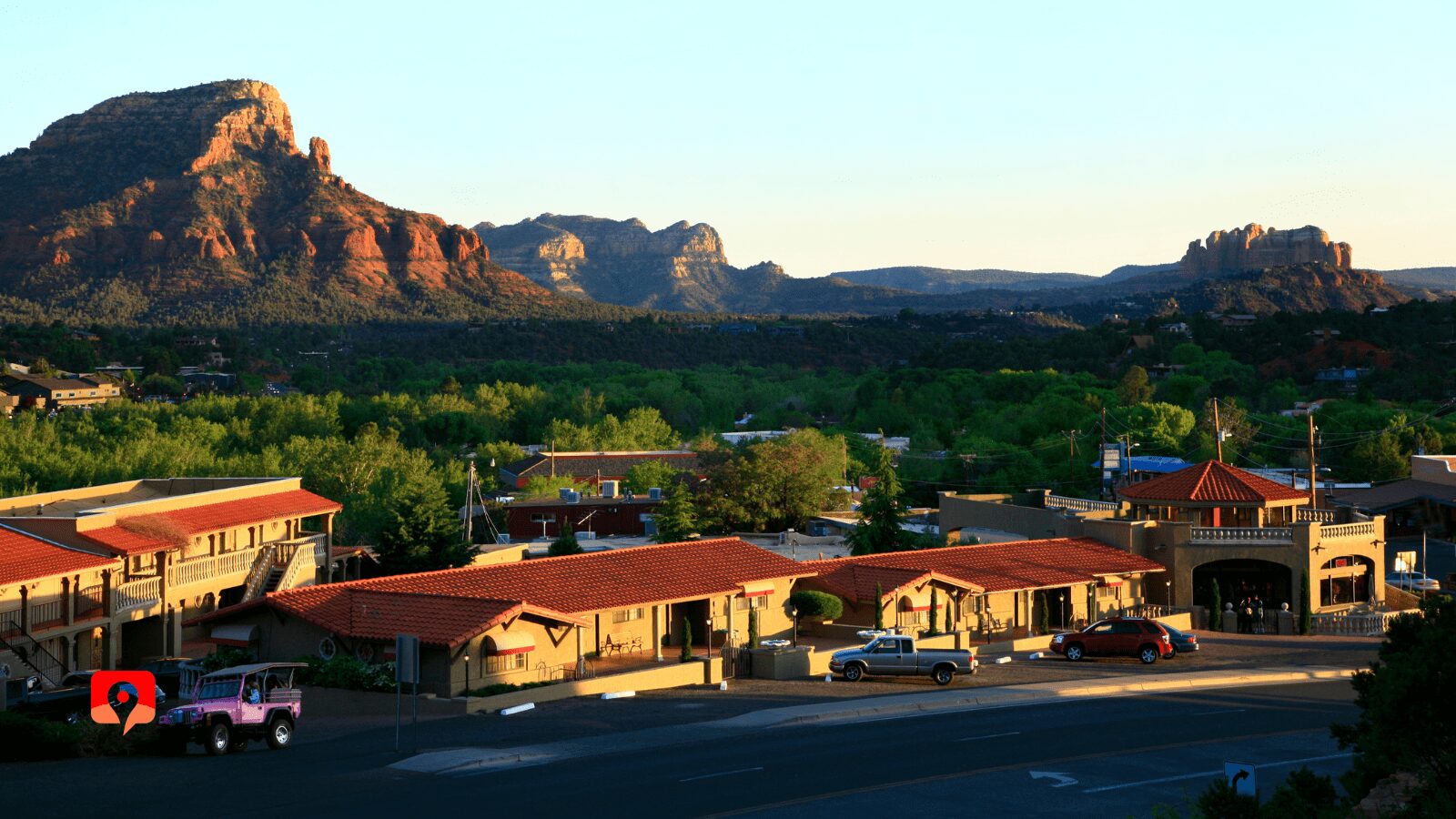
Central Sedona, known as Uptown, is filled with restaurants, art galleries, souvenir shops, and wild views of the surrounding landscape. If you want to explore town on foot, this is the best place to do it. There are two worthwhile stops in town: the Sedona Arts Center and the Sedona Heritage Museum. Exhibits at the latter range from an old stagecoach to a historic apple packing shed, and it’s also home to a century-old railroad depot, relocated here in the 1940s for the John Wayne film The Angel and the Badman.
Completed in 1956, this stunning Catholic church is built right into the Sedona landscape. California sculptor Marguerite Brunswig Staude provided the inspiration for the building’s design. The simple, angular construction features an iron cross that is set into the southwestern facing window, which is visible from the church’s interior and exterior. Many visitors come here to enjoy a quiet moment of contemplation in one of Sedona’s most spectacular settings.

Built on the site of a sycamore grove in the 1970s, this complex of Mexican-style plazas, complete with fountains, wrought iron, stucco walls, and arched entryways, is a delight to wander through. The name Tlaquepaque comes from a Mexican village near Guadalajara, and is a native Nahuatl word that means “best of everything” or “place above clay land.” Today, Tlaquepaque hosts art galleries, jewelry shops, Navajo rugs shops, restaurants, and a delightful chapel. It’s a lovely place to either browse or grab a bite to eat.

While this park is most famous for its natural water slide, there’s more here than cool summer fun. This was once the site of the Pendley Homestead, founded by Frank Pendley – and two burros – in 1910. Pendley acquired 58 acres of land through the Homestead Act, and proceeded to cultivate an apple orchard, beginning in 1912, along the banks of Oak Creek.
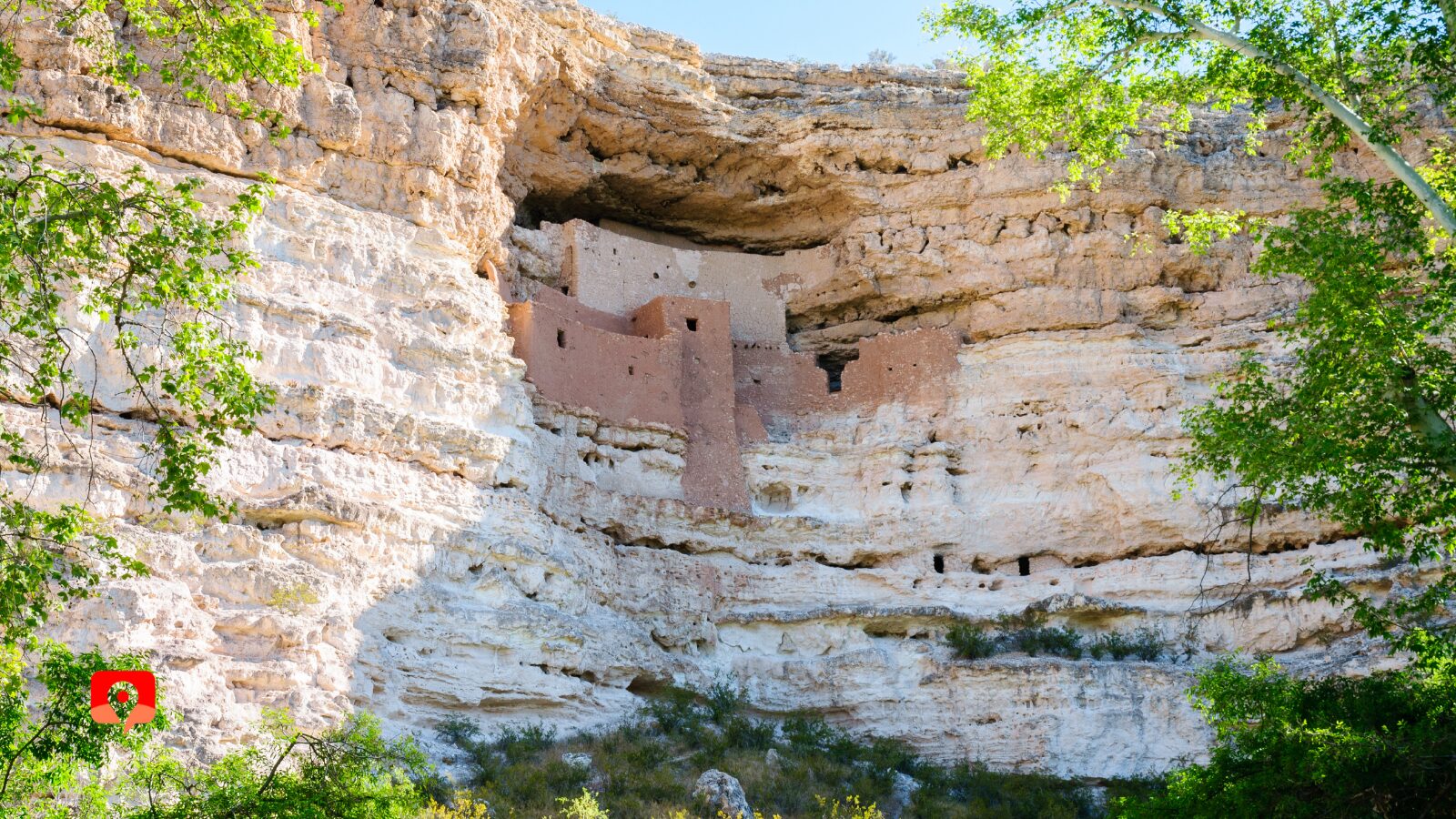
Just 12 miles (19 kilometers) south of Route 179, right off I-17 and conveniently located between Phoenix and Sedona, is Montezuma Castle, one of the best preserved and most accessible cliff dwellings in Arizona. From 1,125 to 1,400, the Sinagua people lived in this five-storey dwelling, which was built into the side of a canyon wall, roughly one hundred feet above Beaver Creek. Nearby is Montezuma Well, where more Sinagua ruins are scattered around a natural limestone sinkhole, filled with natural spring water. A large number of petroglyphs can also be found at the V Bar V Heritage Site, also nearby.
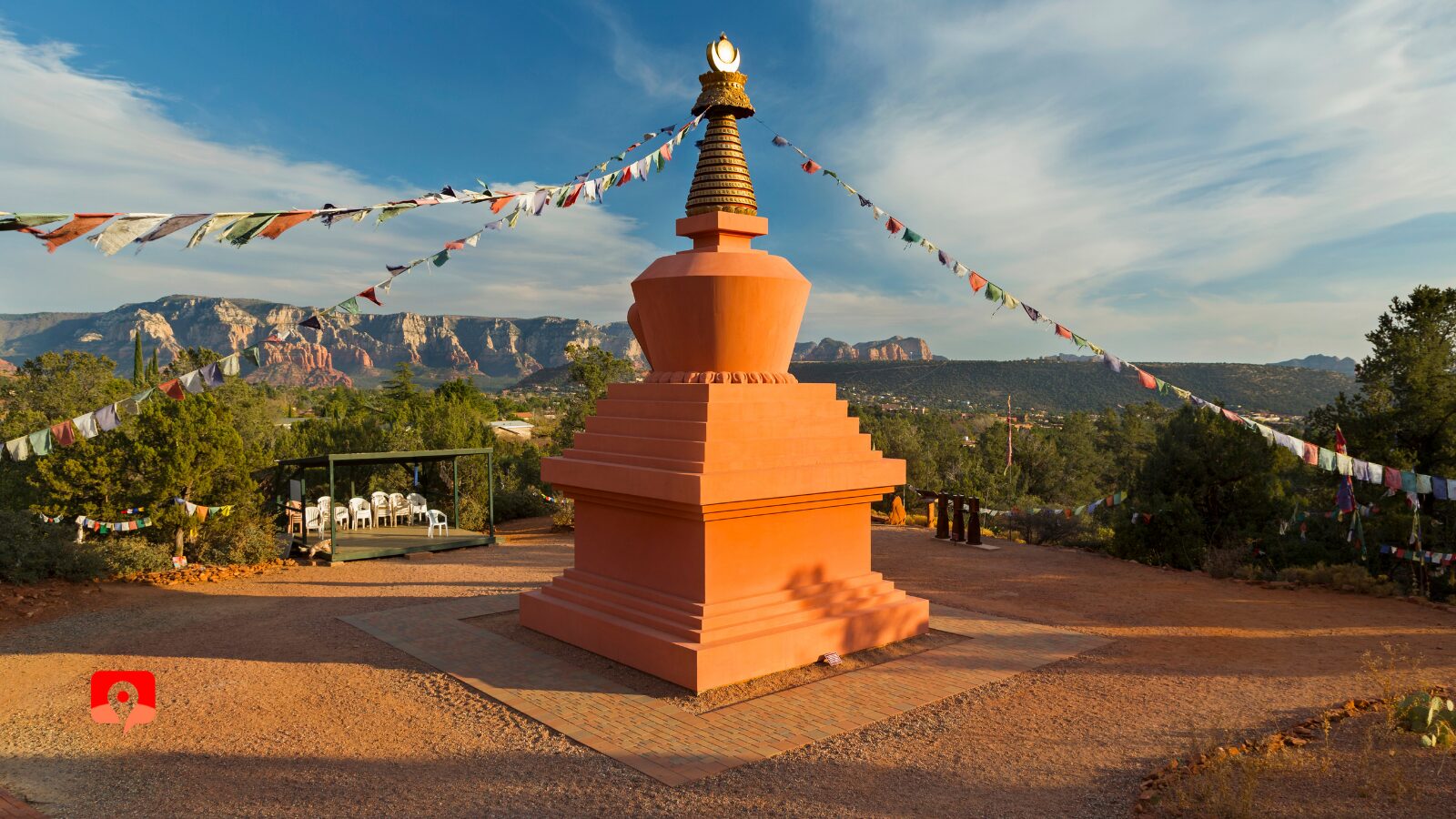
Contemplate the sacred at this Tibetan Buddhist shrine and peace park, located at the base of Thunder Mountain. Included inside this particular stupa are mandalas, nearly one billion prayers for peace, and soil and medicine from around the world.
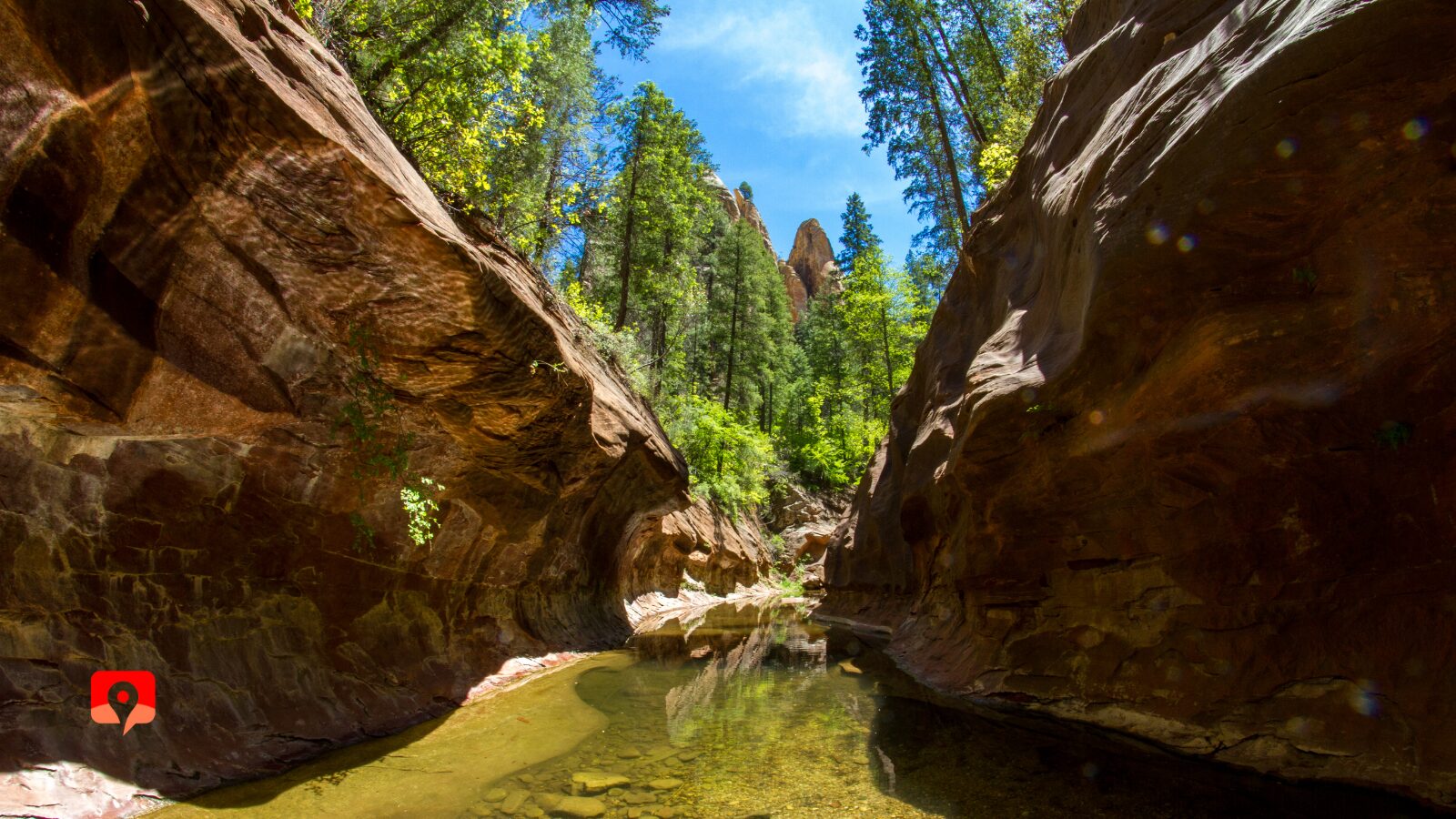
This highly photogenic six mile hike follows the creek past canyon walls that rise over 200 feet (61 meters) up, and the lush tree-lined riverbed provides the perfect contrast to the arid desertscapes surrounding Sedona. While most hikers will be content to walk three miles to the official end of the trail, you can actually keep going upstream for a more adventurous experience. Regardless of how far you hike, expect numerous stream crossings over stepping stones and logs. In most seasons the creek is only a few inches deep at such spots, so if you have appropriate footwear, it might be easier to just get your feet wet.

Drive out to the Back o’ Beyond for this short half-mile jaunt to magnificent Cathedral Rock, complete with breathtaking views back toward Sedona. You can continue ascending the slickrock staircase as far as you’re willing, but remember that sandstone is fragile, so watch your step!
Bell Rock is the first major rock formation you’ll pass if approaching Sedona from the south. Stop off at the northernmost trailhead to explore a multitude of hiking options – there’s even mellow mountain biking here. The quickest hike gets you to Bell Rock in half a mile (800 meters), but if you’re up for a longer excursion, the Courthouse Butte loop trail circles both formations and is 4 miles (6.5 kilometers) long.

Boynton has a little bit of everything: a vortex, a photogenic spire known as the Kachina Woman, Ancestral Puebloan ruins, a hidden cave-like formation known as the Subway, and gorgeous views of the box canyon the whole way. Hiking distances range from one to six miles, depending on your destination. The shortest hike is to the vortex and the Kachina Woman. This is called the Vista Trail.

Although private planes really do land on top of this mesa, you’ll be going up here to check out the views. About three-quarters of the way up the road is the Airport Loop trail, which is a 3.5-mile (5.6-kilometer) moderate hike that circles the butte. For the full 360-degree panorama, this is the way to go, though you can make the walk as short as you like. The trailhead is also near the location of the Airport Mesa vortex. Some people believe that the gnarled and twisted juniper trees here are energy hot spots.

Shh… this one’s a secret. Well, relatively speaking. Another short jaunt – less than half a mile (800 meters) one way – leads to primo views of Cathedral Rock. It’s particularly lovely after a rainstorm, when the natural sandstone potholes form shimmering pools that catch Cathedral Rock in their reflections.
Devil’s Bridge is a popular destination, and with good reason: Sedona’s largest sandstone arch is the place for Instagram-worthy photo shoots! The walk is not particularly difficult, but there is some scrambling, and venturing on to the top of the arch may test your nerves. This trail is a strenuous 4 miles (6.4 kilometers) round-trip.

Sedona keeps kids of all ages entertained: natural water slides, Native American ruins, hot air balloon tours, and mountain biking and tubing are just some of the ways to stave off boredom. Wherever you go and whatever you do, make sure you always bring plenty of water.

If the sun is already scorching hot, there’s no doubt about it: the creek is the place to be. Natural swimming holes at Grasshopper Point and Slide Rock State Park in Oak Creek Canyon are good for general splashing around, cliff jumping and zipping down a bumpy 80-foot (24-meter) long natural water slide.
On the Verde River, which you can access in Cottonwood, west of Sedona, you can also arrange float trips on inner tubes or inflatable kayaks.
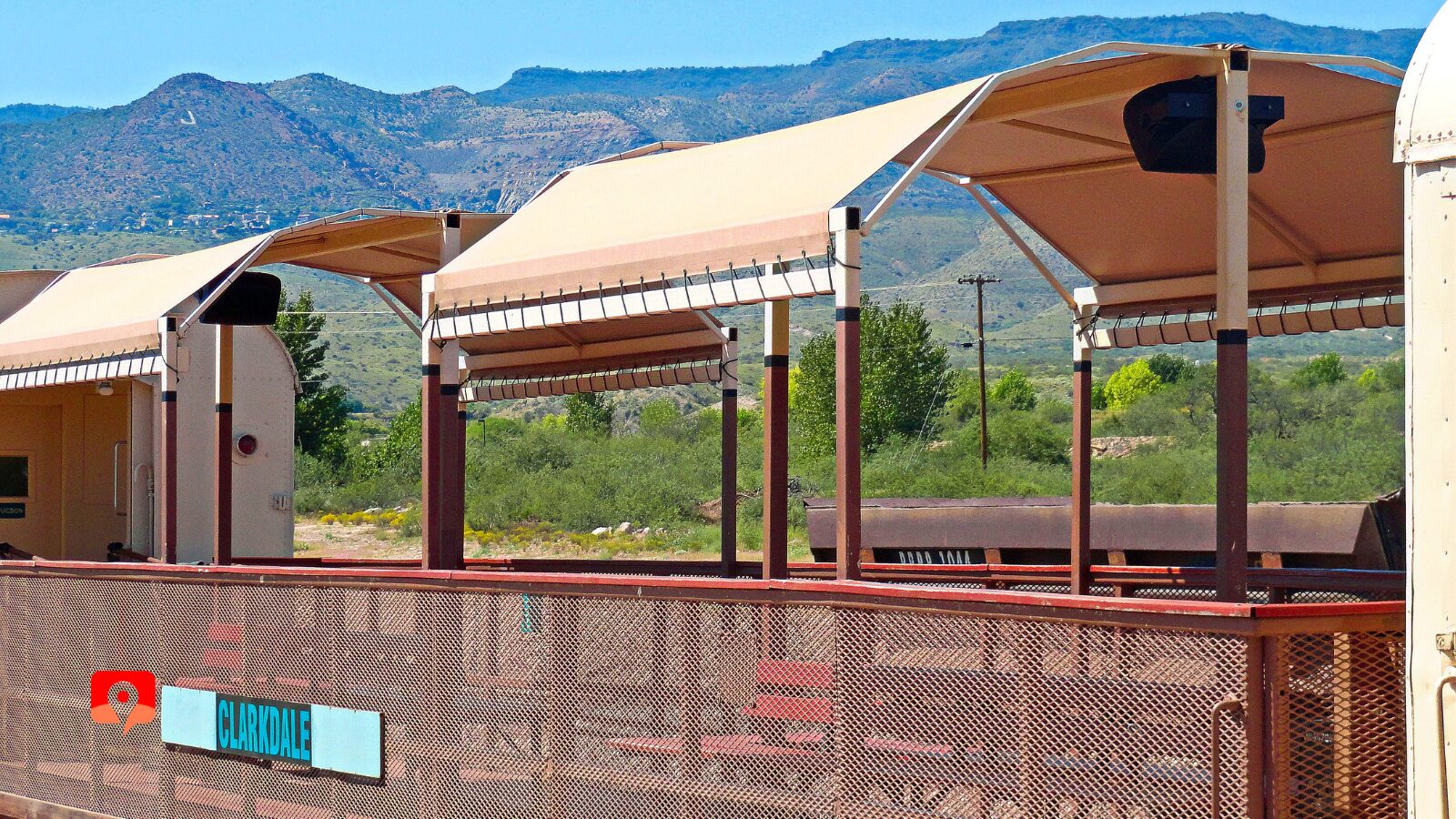
Travel back in time on this historic railway line. Dating back to 1912, this four hour journey explores the scenic Verde Canyon, which is accessible only by rail. The depot is located in Clarksdale, which is located just east of Sedona. Reserve in advance.

Mountain biking in Arizona is, simply put, awesome. But you don’t have to be able to slalom through teddy bear cacti or bunny hop over giant boulders to enjoy two-wheeled fun on slickrock. Several trails, like the Bell Rock Pathway, are totally flat and require no technical expertise apart from being able to pedal. If your kids do like adventure, however, there are some truly hair-raising trails in Sedona to zip down. Whatever your skill level, we highly recommend renting some bikes for the family.

Visit cliff dwellings at Montezuma Castle, Honaki, or Palatki, or visit the ruins of a pueblo village at Tuzigoot. The largest collection of petroglyphs in the Verde Valley is located at the V Bar V Heritage Site.

Sitting in the backseat of a white-knuckle 4WD tour can be a great way to get up close to the desert scenery and have a few thrills on the way – without having to negotiate any hiking durations. If the thought of off-road vehicles in the backcountry makes you cringe, consider the inimitable views that a hot air balloon offers instead.

Even if the kids roll their eyes every time you mention the word hike, there’s no denying the spectacular appeal of the red rock landscape. Rambling over the sandstone slickrock can feel like one endless playground, with plenty of things to climb upon, jump over, or fill up with imaginary adventures.
If you’re in need of a playing field, basketball or volleyball court, or play structure, Sedona’s two city parks are the place to go. Check out the Posse Grounds or Sunset Park. City parks have playgrounds and playing fields.

There are at least half a dozen companies offering off-road jeep adventures in town, taking you on heart-pounding adventures to all those places you simply can’t access in a car: Diamondback Gulch, Broken Arrow, and Schnebly Road for starters. If adrenaline isn’t for you, there are plenty of quieter options to choose from. You can even drive to the Grand Canyon for a day trip.
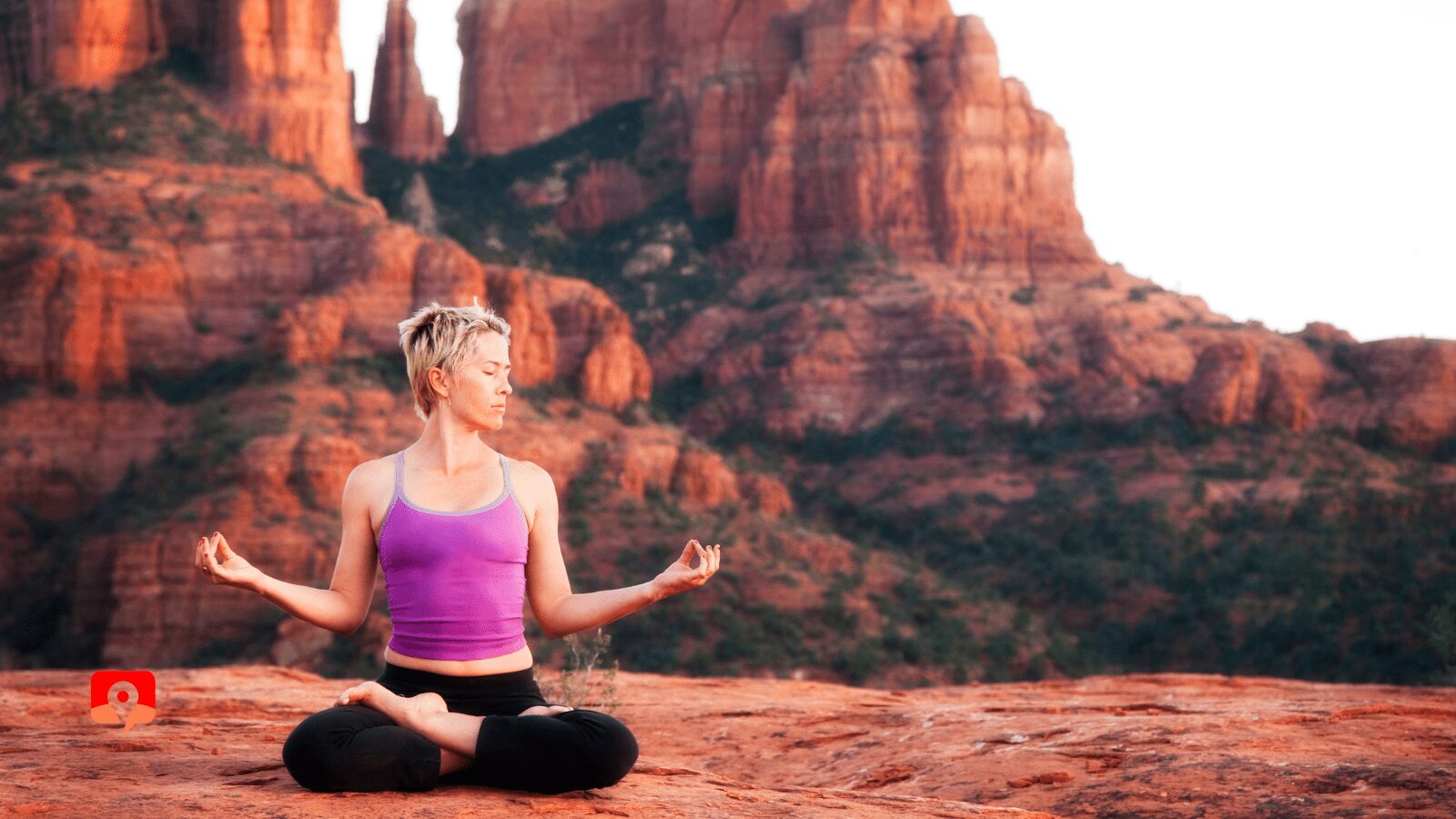
Whether you sign up for a full-on retreat at a resort or a 90-minute class outdoors in the desert, Sedona has plenty of opportunities to perfect your sun salutations.
Tap into the earth’s energy at one of Sedona’s many vortexes. These spiritual centers attract those seeking inner peace or healing experiences. There are also a number of massage therapists in town.

While Sedona is full of fun mountain biking trails, you don’t need to be a daredevil to enjoy a two-wheeled desert cruise. Rent a bike in Oak Creek Village or Sedona ask a local for their favorite scenic ride.

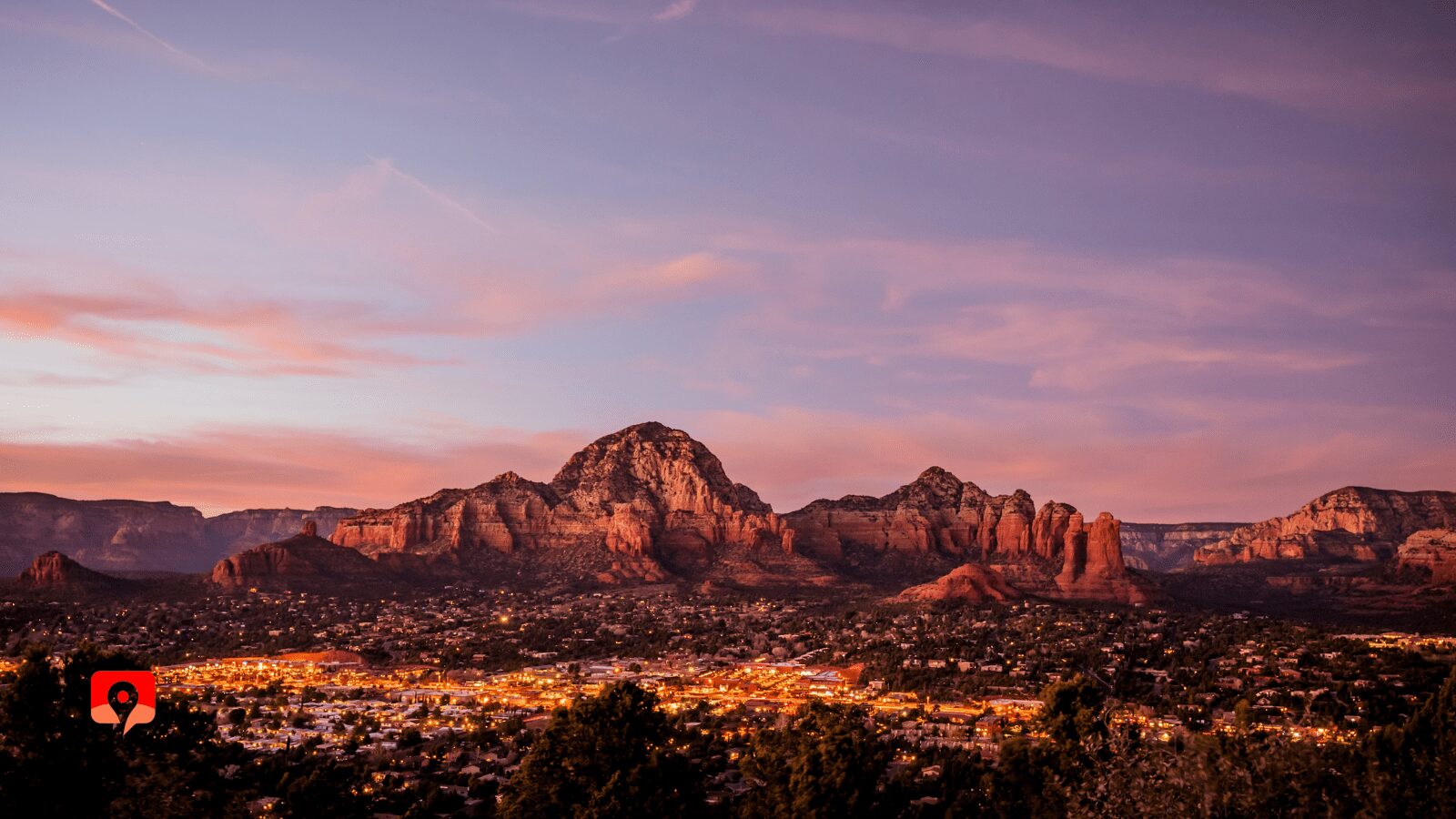
This in-town perch is famous for its magnificent color-drenched hues as the sun sinks beneath the horizon. Come early to secure your spot and bring a camp chair and sweater. Parking fees apply on Airport Road.
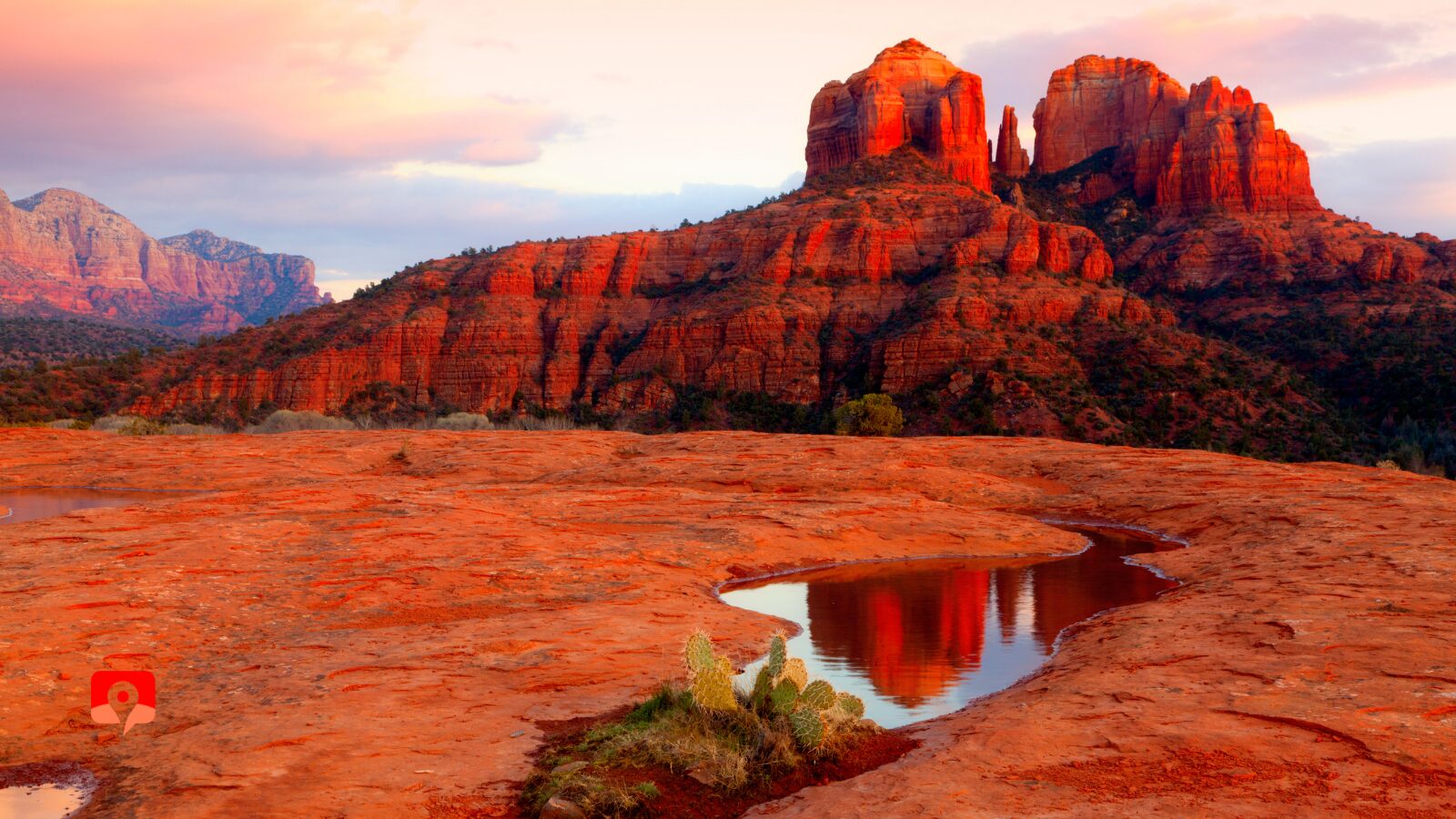
This not-so-secret overlook off the Red Rock Loop Road offers fabulous views of Cathedral Rock, reflected in the pools of water that form in natural depressions in the sandstone after a rainstorm. You’ll need to hike a short way (less than half a mile or 800 meters) to reach the overlook.
Hike on out to this Sedona icon for desert panoramas and clamber up to saddle for the best experience. The easiest access is from Back O’ Beyond Road, off Route 179. It’s a 1-mile (1.6-kilometer) hike round-trip.
If you’re an early riser and reasonably fit, consider hiking out to Devil’s Bridge to catch the sunrise. It’s a 2-mile (3.2-kilometer) hike out to the formation, but it’s worth the effort. This may be the only time of day you’ll have it to yourself.
Extra Layers: The elements in Sedona are fierce. Temperatures can change in the blink of an eye and intense thunderstorms can roll in out of nowhere, causing the mercury to plunge, even on hot summer days. Expect evening temperatures to be much cooler than during the day. Always keep an extra layer and rain jacket in the car, just in case.
Hiking Shoes or Boots: Some people prefer boots, which provide ankle support, while others opt for trail-running shoes, which are lighter weight but still have grippy soles. Either way, make sure that your shoes are snug and that they have a good sole—otherwise you may find yourself sliding down the sandstone. The desert is not the place to wear flip-flops or open sandals, though closed-toe water shoes can work.
Hiking Poles: Light-weight hiking poles are like having a third leg. They help maintain balance and can get you into a rhythm while walking.
Water Bottles: Always bring water. And make sure you drink it! No matter what time of year you visit, dehydration is always a risk—even if you’re not doing much physical activity. In summer, it’s recommended that you drink a gallon a day. At the same time, remember that in order to stay hydrated, you also need electrolytes, like potassium and sodium. Drinking a huge amount of water without supplementing it may flush all these important salts out of your system. We like to just pop a flavored electrolyte tablet into a water bottle whenever we’re in the desert for this very reason.
Headlamp: You never know when a hike is going to take longer than planned—we always throw a lightweight headlamp in our daypack just in case.
Portable Phone Charger and Cable: If you’re taking pictures with your phone, running out of batteries may result in missed opportunities.
Daypack: A comfortable pack makes all the difference. In addition to carrying an extra layer, water, and headlamp, it’s a good idea to throw a few snacks in there as well.

Acadia Alberta Arches ARIZONA AUSTRALIA Badlands Banff Big Island Big Sur Black Hills Blue Ridge Parkway British Columbia Bryce Canyon CALIFORNIA CANADA Canadian Rockies Canyonlands Capitol Reef Catskills COLORADO Copper Country Trail Death Valley FLORIDA Florida Keys Glacier Going To the Sun Road Grand Canyon Grand Canyon West Grand Teton HAWAII Hikes Honolulu Hoover Dam Hwy 61 Hwy 101 Icefields Parkway Itineraries Jasper Joshua Tree Kancamagus Kauai Keweenaw Key West Kings Canyon Lake Louise Lake Superior North Shore Lake Tahoe Las Vegas Lodging M22 MAINE Maui Mesa Verde Miami MICHIGAN MINNESOTA Mount Rushmore NEVADA New Hampshire NEW YORK Niagara Falls NORTH CAROLINA Oahu OBX Olympic Ontario OREGON Oregon Coast Outer Banks Red Rock Canyon Road to Hana Rocky Mountain Sedona Sequoia Shenandoah Sleeping Bear Dunes Smokies SOUTH DAKOTA Tech Tips TENNESSEE Travel Tips Trip Planners UTAH Videos VIRGINIA Waikiki WASHINGTON Wildlife WYOMING Yellowstone Yoho Yosemite Zion
